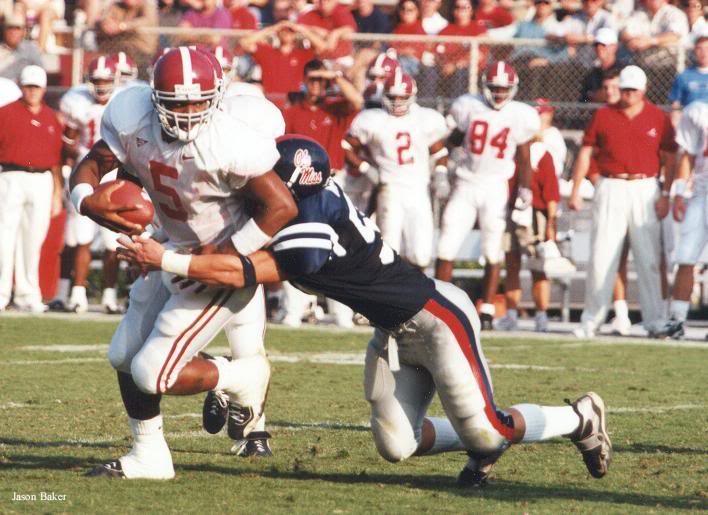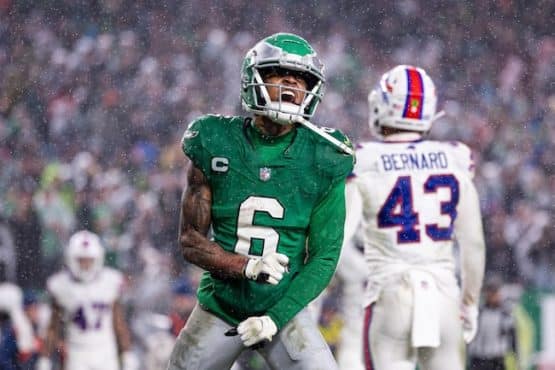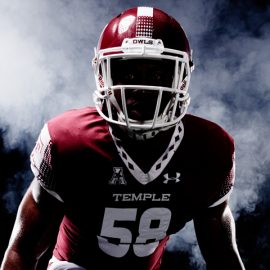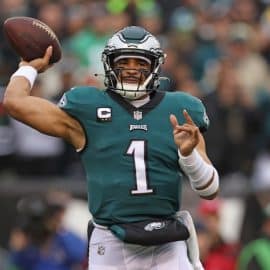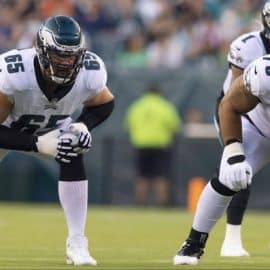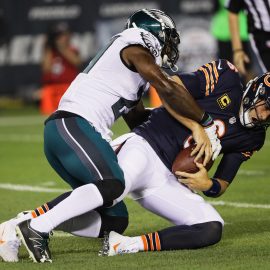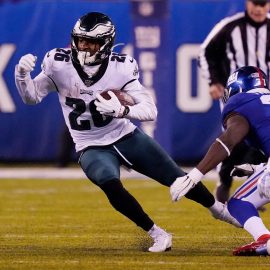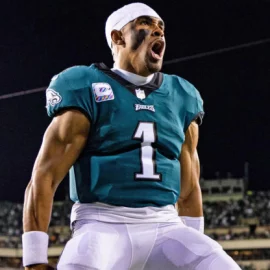Too early to quit at 3-5 with two offensive flop weeks in a row? — Yes, I believe so…
Give the Chippah his due. He's essentially employed as ownership's subcontractor manager on the job site. Perhaps his greatest accomplishment so far in 2013 is successfully delegating authority within the ranks of his defensive and special teams coordinators. Kelly seems to know how to stay out of the way when it comes to those specialty areas of coaching. The result has been positive in a big way— Bill Davis on defense and Dave Fipp on special teams both seem to be improving their units' respective performance on a week-to-week basis.
I'm guessing the major problem Kelly is having at the NFL level is letting go of his thumbprint on the Eagles' offense.
Of course there have been injury issues at the most important position on the Eagles at QB… but I don't think those injuries to Vick and Foles have much bearing upon the fact that Kelly is having some problems calling an offense in the NFL.
I personally feel Chip and the Eagles would be better served if Kelly stepped outside the play-calling role and allowed his offensive coordinator (Pat Shurmur) to establish his own unique attack.
After all, a head coach is supposed to be a manager of other specialty managers… and it would appear to me that the Chippah is way too involved in the design of his own personal offense long after the fact that the rest of the NFL has solved his original Rubik's Cube…
Coach, sometimes it is a better play if you walk away from the play-calling drama… Head coaches calling offenses is typically a sign of desperation in the NFL.
So is Kelly a glorified wanna-be offensive coordinator in the NFL? Yes, I think that is his mindset. He truly believes you can will your way to football victory with a superior intellect calling the offensive plays. The problem with that thinking is, when things go awry, your players on offense tend to blame the play-calling. And if the guy calling the plays is the head coach, well then now you've got a bad situation. That is when players start to quit on the coach and seek to save themselves for next year and possibly another head coach…or another team.
It is also when fans turn on the head coach, too.
I remember a dark period in the Baltimore Ravens' history which illustrates why a head coach in the NFL should stay away from calling his team's offensive plays.
Brian Billick fired offensive coordinator Jim Fassel on October 17, 2006, assuming the role for the remainder of the season, as the Ravens earned a franchise best 13–3 record, won the AFC North and earned their first playoff bye in team history. Baltimore, however, lost to eventual Super Bowl champions, the Indianapolis Colts, 15–6, in the divisional round. In 2007, the Ravens dramatically dropped to 5-11. That prompted team owner Steve Bisciotti to fire Billick. "The team has to move on," he said. He was replaced by John Harbaugh.
In summary, Billick was fired because he could not let go of his desire to call the offense. He could not be objective about an opponent's defensive strength or the weaknesses of his own personnel on offfense. And over a period of about 20 games, the Ravens offense got worse and worse.
Fassel was fired as offensive coordinator of the Baltimore Ravens when the team was 4-2. Brian Billick wanted to get more firepower from the league's 28th-ranked attack. The Ravens scored only 10 offensive touchdowns in their first six games back then and were held to 16 points or fewer three times. Even though Baltimore sat atop the AFC North, Billick felt a change in the team's offensive philosophy was imperative.
"Clearly, in order for us to expand on our 4-2 start, we have to have more offensive productivity," Billick said at a news conference at the Ravens' headquarters. "It was my opinion going forward, in order to bring about the level of production that we need offensively, to get where we want to go, that I needed to step back in on a day-to-day basis."
And there is where the hubris of head coaches with dreams of offensive genius brings them down and out.
Oh, Billick did manage to temporarily appease his players and fan base by taking over the play-calling.
At the time, Billick could no longer tolerate his team's sputtering offense, which had brought about some grousing in the locker room. Then-wide receiver Derrick Mason said "the (heck) with football" after going without a catch in a 23-21 loss to Carolina, and Jamal Lewis complained about being forced to share time in the backfield with Musa Smith and Mike Anderson. "Everyone wants to know where the old Jamal Lewis went," he said. "When you hear things about who's hot or who's not or whatever, a lot of that I just feel like is smoke being blown. There's nothing you can do about it."
Billick took over the play-calling and things went okay for a while— but eventualy the wheels came off the bus. Billick eventually was fired because he had overestimated the talent of his veteran personnel on offense and could not objectively distance himself as a head coach from his chosen heroic role as offensive mastermind.
Not to get too psychological in a comparison here, but I think the Chippah has a lot of Brian Billick-type hubris in him and is now struggling with the idea that maybe you would do better as a head coach to allow your offfensive coordinator as much freedom as you do your defensive and your ST coordinators…
I don't think it's a detriment to a team to have a head coach who's involved from time to time in an offensive play-call decision. I just feel it's a disservice to the team when a head coach is calling every play. It makes a head coach look like an idiot when he calls the wrong play…or even a good play that simply didn't work out. No head coach should ever put himself in the position of being the guy who blew the call. That is a no-win situation for the head coach, the fans, and the players alike… And if a play called by the head coach goes wrong often enough, that is when your players like Derrick Mason or DeSean Jackson start to hold back and kind of "quit", making sure they save their bodies and their minds for the next generation of offensive guru which is surely going to replace your current head coach…
Coach Kelly may soon figure out that there is some valid criticism of his offensive methodology, and that he might want to delegate more if not all of the Eagles' offensive strategy to a guy who reports to him.
At least with more of a hands-off approach to the offense, Kelly can personally avoid a lot of the criticism that inevitably falls upon the team after a completely ineffective offensive efffort.
Here's Eliot Shorr-Parks of NJ.com with a sort of summary of complaints directed at Chip Kelly as a direct result of his offensive play-calling against the Giants this past Sunday.
"There are plenty of reasons to question Kelly after Sunday's debacle against the Giants…
1. Starting Michael Vick
Kelly's Explanation: "He felt good about it. Our training staff and doctors felt good about it. We as a coaching staff didn't see any effects in terms of him doing anything from a practice standpoint."
My Take: With Vick being injured on just the second or third series, it's hard to say that starting Vick was the right call. Hind-sight is always 20/20, however. Vick said thoughout the week he was fine and Kelly got the OK from doctors. Sunday's game was huge, and it's clear Kelly wanted his starting quarterback out there. Hard to blame him for that, even if the results might say otherwise.
Verdict: Right Call
2. Timeout at the two-yard line
Kelly's Explanation: "I wanted to get Matt (Barkley) settled. We went and talked about (the upcoming play)."
My Take: Barkley was in a groove, having completed three straight passes out of the no-huddle offense. Kelly's offense is big on forcing the defense to keep the same personnel on the field, so calling a timeout with the rookie on-fire (or at least as close as he can get) was questionable. Throw in the fact that it came with under two minutes to go, and the decision made no sense.
Verdict: Bad Call
3. Decision to throw on the two-yard line
Kelly's Explanation: "We've practiced (that play) continuously here six weeks or seven weeks since the beginning of the season in the red zone. It was just a naked one-route with DeSean (Jackson) out wide and then the tight end on a drag on the back side. It we didn't have it, throw it away"
My Take: This was probably the biggest play of the game, and arguably Chip's worst play-call since he's come to Philadelphia. Two yards out with a first down, there is no reason LeSean McCoy shouldn't touch the ball at least two of the next three plays. Kelly didn't get that chance, however, as he asked Barkley to roll out to his off side- which isn't his strength- and the rookie fumbled it.
Verdict: Bad Call
4. Punting from the 47-yard line in the 4th quarter
Kelly's Explanation: "It was a two-score game. So I knew we were going to stop them. I have great confidence in our defense…..I felt like we were going to get the ball back with time to score and get an onside kick."
My Take: Kelly's decision making on 4th down has been a disappointment so far. For having the a reputation as an aggressive/risk taking coach, he has been very conservative this season when deciding when to go for it on 4th down. Sunday was another example.
Verdict: Bad Call
5. Going for the onside kick with four minutes to go
Kelly's Explanation: I only had one timeout, so it didn't matter if we kicked it deep, it was still the same amount of time on the clock. We felt like we could get it at that point in time. That was my decision. In terms of the time off the clock it (was) going to be the same exact thing.
My Take: Kelly does have a good point in that the timing didn't matter. The field position, however, did. The defense was playing well at that point, and by kicking it deep the Eagles had a great chance to force a punt. Put DeSean Jackson back there, and who knows what happens. By onside-kicking it, however, the defense was a first down away from potentially letting up a game-clinching field goal.
Verdict: Bad Call "
Thanks, Eliot Shorr-Parks… And I'm sure our Bored members at the EYE could add a few more examples of why a head coach should remain aloof from the minute-to-minute offensive decisons or play-calls that can ultimately shape a losing effort. As usual, the meddling head coach will be blamed.
But at 3-5 and still alive in the NFC Least divison, I give the Chippah the benefit of the doubt. He has seen what he needs to see. He has had the time to reevaluate his delegation of duties on the offensive side of things. Maybe it's time to let go of what worked for him in the NCAA on offense and come to terms with just not the limitations of his current personnel but also the advance scouting talents of his opponents.
Let go and let someone else call the offense. It will be Chip's next best challenge. It could very well be his most courageous step to becoming a real head coach in the NFL.
Add The Sports Daily to your Google News Feed!
